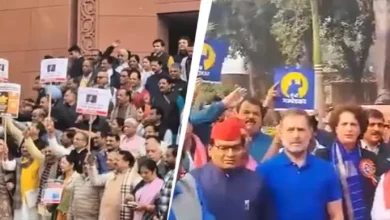India braces for intense civil unrest amid deepening farmers’ agitation
 New Delhi: The ongoing farmer protests in India have been fueled by discontent among peasants regarding agricultural laws and policies implemented by the Modi government, posing drastic challenges to the government with all the potential to erupt into a broader agitation with far-reaching consequences.
New Delhi: The ongoing farmer protests in India have been fueled by discontent among peasants regarding agricultural laws and policies implemented by the Modi government, posing drastic challenges to the government with all the potential to erupt into a broader agitation with far-reaching consequences.
According to Kashmir Media Service, the steadfast determination of the farmers, coupled with their widespread support among various segments of society, underscores the depth of discontent within the agricultural community.
#FarmersProtest2024 #Farmersprotest #kisanprotest #KisanAndolan2024 pic.twitter.com/YTV2a7tvTp
— KashmirMedia Service (@kmskashmirnews) February 14, 2024
If the grievances of the farmers remain unaddressed, the protests may evolve into a larger movement, promptly leading to a protracted crisis with profound implications for India’s social, political and economic landscape.
The Modi government’s response to the protests is being closely monitored both domestically and internationally, with implications for India’s democratic credentials and governance, if not political integrity.
Since late 2020, farmers, primarily from Sikh-dominated states of Punjab, Haryana, and other states, where a separate homeland for Sikhs in the name of Khalistan is very much strong, have been mobilizing in large numbers to voice their grievances against detrimental reforms to the agricultural sector.
Farmers fear the introduction of new farm laws by the Indian government will undermine their livelihoods by deregulating crop pricing and diminishing the role of government-regulated wholesale markets.
Today, protesting farmers resumed their march towards Delhi, undeterred by tear gas shelling and clashes with Indian police at the Punjab-Haryana border. Despite heavy police presence, concrete barricading, and roadblocks, thousands of farmers pressed forward with their ‘Delhi Chalo’ march.
The Indian police, in response to the farmers’ advance, resorted to firing tear gas for the second consecutive day to deter them from approaching the barricades. The clashes and disruptions have not only caused traffic chaos on expressways but have also led to the suspension of mobile internet services and other communication channels in several districts, including Ambala, Kurukshetra, Kaithal, Jind, Hisar, Fatehabad, and Sirsa.
The ‘Delhi Chalo’ march, spearheaded by the Samyukta Kisan Morcha and the Kisan Mazdoor Morcha, follows inconclusive talks with the BJP government. The farmers’ demands for MSP guarantees and loan waivers remain unmet, prompting them to escalate their protests and take their grievances to the nation’s capital.








